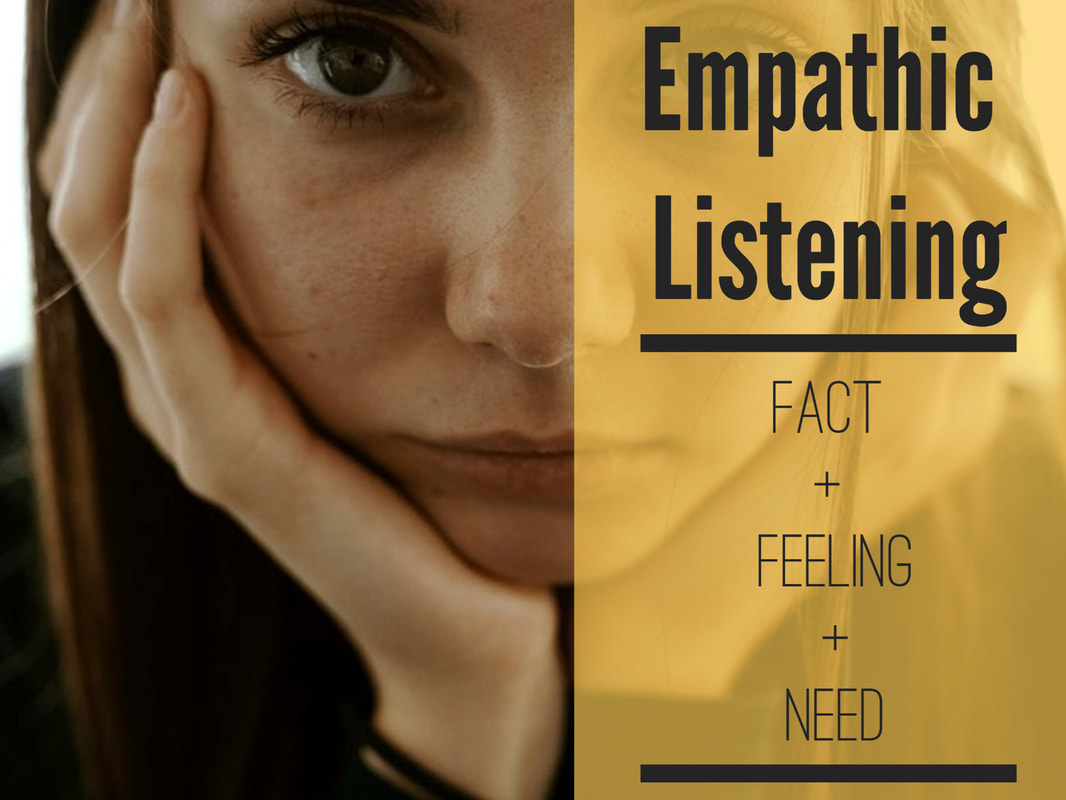|
To earn someone's trust we have to truly hear them. Every human being needs to feel they are respected, and that they matter.
Empathic listening is a way to earn that trust. By listening for the fact of what is being said, feeling the feeling they have, and then searching for the need is a way you can reflect back to the person what they have said in a way they feel truly heard. This technique is very difficult to do at first, but over time as you become well versed in being able to pull out the fact, the feeling and the need, and putting that in a sentence that you deliver back to the other person in a way that helps them feel that you really get them. Example: Person A: I have to cook every night for a large family, and when I get home I just feel angry because I am tired and no-one helps me. FACT: Has to cook FEELING: angry, tired NEED: Support, help Person B: You are angry because you need some support with the cooking when you are tired? OR You are angry because you need some help when you are tired and you have to cook?
0 Comments
Isolation and loneliness are have been written about as the latest epidemic in our modern society. Humans are social beings and their survival through the ages has depended on this very fact. Yet, in our neighbourhoods and our shopping centres, people feel very isolated and alone despite having access to all the technological tools in the world to connect. Why is this? I remember a time when visiting people was a thing we did on weekends. We would sit for hours, talking and having fun. While this happens online, it doesn't seem quite the same anymore. Life has become packed, busy with all the things that keep us stuck in our phones, and not present to those in our immediate surrounds. So how do we get back to connection? Here is a list of what we can do to start to move in that direction.
12 Steps Back to Connection 1. Learn about Needs and make a list of your needs. 2. Learn about Feelings - how do you feel when your needs get met, or don't get met. 3. Get clear about your Beliefs on getting your needs met - attend Belief Busters, or do The Work of Byron Katie. 4. Brainstorm ideas around what you discovered in Step 3. 5. Cherry pick only the best ones. 6. Structure a request around how to get your needs met. 7. Consider the timing and do-ability of your request. 8. Make time for your request (not a demand) to be communicated, then communicate it. 9. Wait for the person to respond, and don't always expect agreement. 10. If needed, use active and empathic listening to discuss your request. 11. Experience connection if the person does connect with you, or modify your request according to the feedback you get. 12. Bask in the glory of connecting with another person in a shared experience of trying to get your needs met so you both can feel good. The script above has come from personal trial and error, and a multitude of approaches to communication. If you need any help with communication at home, or in the workplace, and want to learn more about how to enjoy your social life, book a session with me, or come to Belief Busters at the LECNA Community Centre in Springwood, 7pm - 8:30pm, Tuesday evenings, $5 door entry. Have you ever felt drained by your partner? Like everything you do is neither noticed or acknowledged? You feel like you have been taken for granted and receive nothing in return? This symptom usually indicates there is an imbalance in giving and taking. I can already hear you saying: "Sure! I already know what that is about! You are not telling me anything new!" I agree. BUT... here is the secret sauce... there are some tells that allow us to see where giving and taking is not just about about loving and giving everything you've got. Its about reciprocation, a full exchange, where each gives a little more each time there is an exchange.
What to do with someone who fasts or helps too much?
This is where it gets tricky. Beliefs around giving and taking may prevent a person from not taking or worse, make them give too much. Previous childhood experiences may have something to do with it where they may have had a dangerous parent, or they were bullied at school. It could also have to do with feeling safe, and their experience of relationships e.g. did they keep their friends, lose their person etc. When it really is too much to handle... If the behaviour is starting to damage a relationship, make someone feel uncomfortable or causes them to want to leave the the relationship, then its time to see a counsellor. You can also attend Belief Busters at the LECNA Community Centre this Tuesday evening at 7pm to learn more about giving and taking in relationships. SMS Nikki Ward on 0417 435029 to book in. |
AuthorI am passionate about being the catalyst for change for the better, supporting the greater good to create causes and conditions to benefit everyone down the track. Archives
March 2023
Categories
All
Back to Home
|



 RSS Feed
RSS Feed